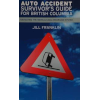 Jill Franklin was injured in a collision in 1990 while walking on the streets of Vancouver. Based on her experience she wrote the Auto Accident Survivor's Guide for British Columbia. It details her experience dealing with ICBC and the provincial medical system. The book is now out of print but can be read on line for free.
Jill Franklin was injured in a collision in 1990 while walking on the streets of Vancouver. Based on her experience she wrote the Auto Accident Survivor's Guide for British Columbia. It details her experience dealing with ICBC and the provincial medical system. The book is now out of print but can be read on line for free.
Regardless of the fact that it is dated, it still contains useful information that applies today and in places other than British Columbia.
Thanks to the Internet Archive, the text can now be read on line free of charge. All that is required of you is to create a user account, which is also free of charge.
If You are in an Accident
Based on Jill's experience you are going to have to advocate for yourself if you are involved in an accident.
From the Introduction
This isn’t the kind of book I normally write, but it’s the book I wish I'd had after I was hit by a car while crossing the street in Vancouver, I trusted B.C’s medical-legal-insurance system to work for me without realizing that it was up to me to make sure it did,
While my personal experiences aren't discussed in this book, they made me realize how much a book like this is needed. My injuries required extensive surgery, and I spent two weeks in the hospital, six months in a wheelchair, and several years in rehab. ICBC admitted full liability early on and initially paid my medical and rehab expenses, but they didn’t want to compensate me for my lost income. (The publication of a book I'd finished writing prior to my accident had to be postponed for two years.) Instead, I was sent to a series of medical experts as ICBC tried to find someone who would deny that my injuries had left me with on-going disabilities. My case went to trial, then ICBC appealed the court Judgment. Seven years after my accident, I finally received the money I was awarded, and my lawyers’ accounts were settled.
The problems I encountered are similar to those faced by many auto accident survivors. Doctors may not detect conditions that require treatment. Insurers often assume that claimants exaggerate their problems. The experts they hire tend to downplay people's disabilities. Accident-related income losses can be hard to prove to an insurer's satisfaction, and lawyers’ billing practices aren't always fair, If you're injured in an auto accident, you need to know how to get good medical care, necessary financial help, and competent legal advice. You also need to know what your legal rights are, when to pursue legal action and how to safeguard your interests.
Share This Article
- Log in to post comments
